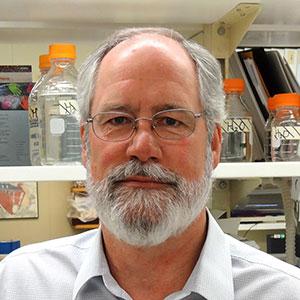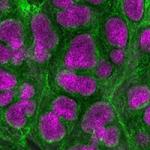
Michael W. Krause, Ph.D.
Senior Investigator
Developmental Biology Section, Laboratory of Molecular Biology
NIDDK
Scientific Director
NIDDK
Research Topics
A goal of our research is to describe the formation of an organism after fertilization as a series of switches that regulate gene expression in each cell at the appropriate time and place during development. The relative simplicity of an organism like the worm C. elegans reduces the number of genes and cell types we need to integrate for this description while providing a rapid embryonic (1 day) and post-embryonic (3 days) developmental program. These attributes allow us to learn more about developmental processes in each individual cell in the organism, something that is extremely difficult in more complex animal systems.
Current Research
We are interested in the transcriptional regulation of cell fate determination during metazoan development. Using the C. elegans system, we exploit forward and reverse genetic approaches to identify and characterize transcription factor function required for proper development of specific cell types, at single-cell resolution. Historically, our interest has primarily been directed at understanding muscle cell specification and differentiation as a model for both embryonic and postembryonic development. Our goal is to fully describe the transcriptional cascade that orchestrates the formation of this tissue from just after fertilization, throughout embryogenesis, and into adulthood.
Applying our Research
By understanding the nature and function of master regulatory genes, we can understand the logic behind developmental mechanisms used by all animals, including humans. More importantly, this knowledge allows us to both understand developmental diseases and to manipulate biology to provide therapeutic interventions or cures. For example, we can now generate stem cells from mature tissue samples by expressing a particular combination of master regulatory genes. This type of basic science research is the cornerstone of disease treatment and therapy.
Need for Further Study
Although we know in general terms the identity and function of several master regulatory genes, we lack a detailed understanding of how these factors orchestrate downstream events at the molecular level. A more detailed understanding is necessary to predict with confidence the full effects of turning on and off master regulators, an issue particularly important for harnessing the power of these genes to regulate developmental events and cure disease.
Biography
- Laboratory of Molecular Biology, NIDDK, NIH, 1993–Present
- Postdoctoral Fellow, Fred Hutchinson Cancer Research Center, 1986–1992
- Ph.D., University of Colorado, 1986
- B.A., University of Colorado, 1978
Selected Publications
- Abete-Luzi P, Fukushige T, Yun S, Krause MW, Eisenmann DM. New Roles for the Heterochronic Transcription Factor LIN-29 in Cuticle Maintenance and Lipid Metabolism at the Larval-to-Adult Transition in Caenorhabditis elegans. Genetics. 2020;214(3):669-690.
- Krause MW, Love DC, Ghosh SK, Wang P, Yun S, Fukushige T, Hanover JA. Nutrient-Driven O-GlcNAcylation at Promoters Impacts Genome-Wide RNA Pol II Distribution. Front Endocrinol (Lausanne). 2018;9:521.
- Zhang J, Chambers I, Yun S, Phillips J, Krause M, Hamza I. Hrg1 promotes heme-iron recycling during hemolysis in the zebrafish kidney. PLoS Genet. 2018;14(9):e1007665.
- Sinclair J, Pinter K, Samuel T, Beardsley S, Yuan X, Zhang J, Meng K, Yun S, Krause M, Hamza I. Inter-organ signalling by HRG-7 promotes systemic haem homeostasis. Nat Cell Biol. 2017;19(7):799-807.
- Fukushige T, Smith HE, Miwa J, Krause MW, Hanover JA. A Genetic Analysis of the Caenorhabditis elegans Detoxification Response. Genetics. 2017;206(2):939-952.
Related Scientific Focus Areas
This page was last updated on Thursday, August 7, 2025

